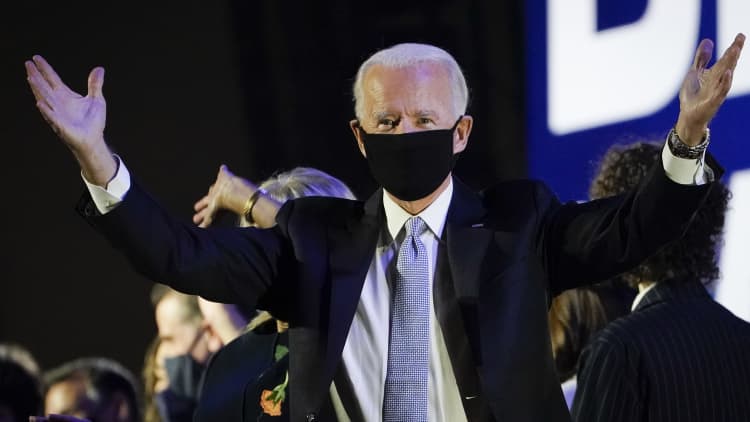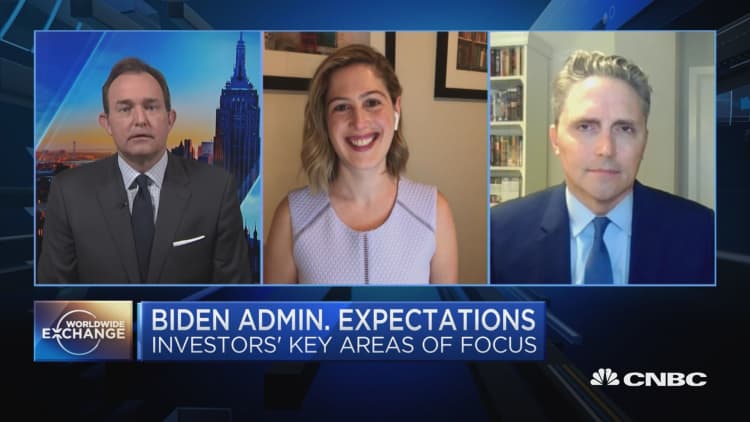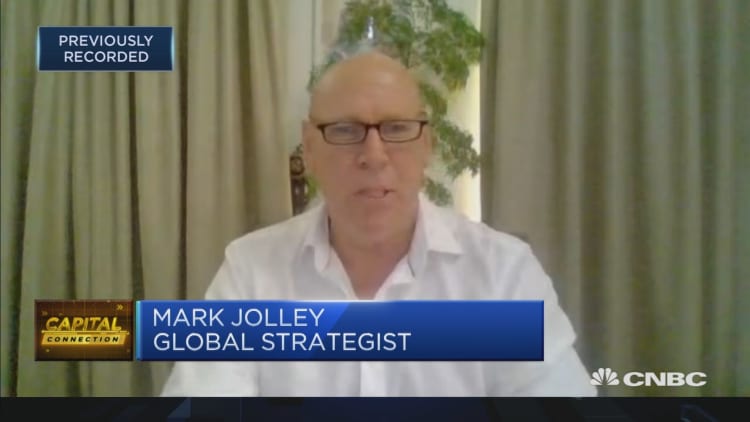Goldman Sachs is anticipating a more "V-shaped" recovery for the global economy than consensus forecasts suggest, and the rebound could now be bigger than expected as hopes rise that a coronavirus vaccine is close.
Global stocks soared on Monday after Pfizer and BioNTech announced that their potential vaccine was more than 90% effective in preventing Covid-19 among those without evidence of prior infection. Dr. Albert Bourla, chairman and CEO of Pfizer, hailed the results as marking a "great day for science and humanity."
The news comes hot on the heels of Joe Biden's projected U.S. presidential election win, and both developments are likely to affect global growth forecasts.

In Goldman's 2021 global economic outlook, published at the weekend, analysts highlighted that Democrats' fiscal policy agenda could run into roadblocks as they looked unlikely to command a majority in the Senate. Despite this, the analysts still expect the implementation of a $1 trillion fiscal package in the U.S., potentially before Biden's expected inauguration on Jan. 20.
More important to the growth outlook, Goldman Sachs Chief Economist Jan Hatzius and his team suggested, will be the new wave of coronavirus infections sweeping through Europe and the U.S., with a number of major European economies returning to partial lockdown measures.
These have caused Goldman's global growth estimates to be revised downwards in the fourth quarter and the first quarter of 2021, but the bank remains confident that the global economy will outpace the consensus among economists polled by Bloomberg.
The bank projects a global GDP (gross domestic product) contraction of 3.9% in 2020, slightly better than the 4% consensus, followed by a 6% expansion in 2021 (versus 5.2% consensus) and 4.6% in 2022 (versus 3.7% consensus), with risks still skewed to the downside.
The IMF (International Monetary Fund) has forecast a 4.4% contraction in 2020 and a 5.2% rebound in 2021.
"Just as the global economy rebounded quickly (albeit partially) from the lockdowns in the spring, we expect the current weakness to give way to much stronger growth when the European lockdowns end and a vaccine becomes available," Hatzius said in the report.
"Assuming the FDA (the U.S. Food and Drug Administration) approves at least one vaccine by January and mass immunization of the general population starts shortly thereafter, as we expect, growth should pick up sharply in Q2 (the second quarter). The apparent lack of scarring effects from the earlier GDP plunge is consistent with this view."

Goldman expects central banks in developed markets to maintain a dovish lean over the next few years, with the U.S. Federal Reserve, European Central Bank and Bank of England only beginning to hike rates again in 2025.
"The main exception is China, where output is already back to pre-pandemic levels, credit is growing rapidly, and fiscal policy remains very expansionary," Hatzius added.
"Policymakers look set to react by easing off the accelerator, which should result in a modest sequential growth slowdown."
Currency implications
Assuming that vaccine and policy news outweigh the northern hemisphere lockdown risk, Goldman's currency analysts are sticking with their short positions on a basket of emerging market and G-10 (Group of 10 major economies) currencies against the U.S. dollar.
On the back of the bank's new economic projections, Goldman Co-Heads of Global FX, Rates and EM Strategy Zach Pandl and Kamakshya Trivedi set their 12-month target for the euro at $1.25, with the Chinese yuan heading to 6.30 against the dollar and Japanese yen to 100. They expect the highest total return on a short position on the Russian ruble against the greenback.

Shorting currencies involves borrowing a currency and selling it at the current market rate, with a view to buying it back at a lower price, in essence betting that the currency will depreciate.
"Given its high valuation and low U.S. interest rates, this economic outlook should translate in broad U.S. Dollar depreciation over the next year, in our view," Pandl and Trivedi said in a note Sunday.
They project a 6% depreciation for the nominal, trade-weighted U.S. dollar over the next year, and currently hold short dollar positions against the Canadian and Aussie dollars in the G-10 bloc, and South African rand, Indian rupee and Mexican peso in emerging markets.
Subscribe to CNBC PRO to access live PRO Talks, including our Dec. 2 discussion on opportunities and risks in international markets.

